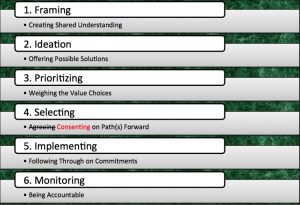I want to share a process tool from Ceasar McDowell, a professor at MIT and civic designer that I had the good fortune of hearing speak at the Frontiers of Democracy conference (#DemFront) at the end of June. He presented a framework for designing inclusive processes for civic engagement, which I believe, can be useful for anyone working collaboratively, and is especially critical in our current democracy. He describes this framework elsewhere in an online video on Democracy, Inclusion, and Community.
 I would like to use this video, and this framework (pictured here), as the content for our reflection this month (note: you can just watch the first 23 minutes). The framework involves six different spaces for dialogue, each of which has a different set of goals and processes. As he says, “people need to know which dialogue they are in.” And, society need spaces designed for each dialogue so that it is inclusive and equitable. By contrast, in the real world, people are often pushing quickly for solutions and action without having the whole picture, and without having all the voices at the table who have vital information.
I would like to use this video, and this framework (pictured here), as the content for our reflection this month (note: you can just watch the first 23 minutes). The framework involves six different spaces for dialogue, each of which has a different set of goals and processes. As he says, “people need to know which dialogue they are in.” And, society need spaces designed for each dialogue so that it is inclusive and equitable. By contrast, in the real world, people are often pushing quickly for solutions and action without having the whole picture, and without having all the voices at the table who have vital information.
You’ll notice I think the framework could be improved by including the principle of consent (that’s my suggested revision in #4). I am curious if others see benefits from this framework for facilitating consent-based decision-making? And, what have you learned from facilitating consent-based decision-making that might be useful for this framework? Is there value in distinguishing between “agreeing” and “consenting,” in the context of selecting paths forward, or is that just semantics?
Looking forward to learning together! Hope you have time to watch the video before the call, but even if you don’t, you are welcome to join us.

